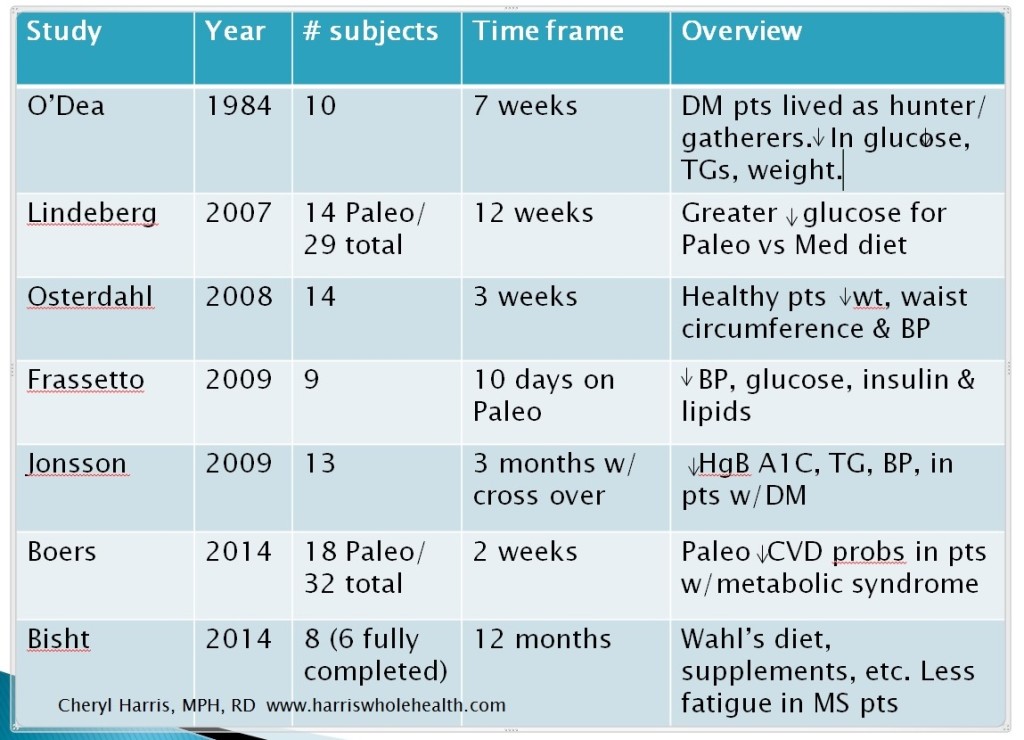I usually don’t weigh in on the pros and cons of the Paleo diet, because what I’ve found over time is that holding a nuanced opinion usually succeeds only in making most people angry. But since it’s snowing and I’m getting my slides ready for an upcoming webinar on eating Gluten-free and Healthy on March 18, 2015 I decided to post my annual research romp on grain-free diets. For the record, I don’t think I have a “side”. My job is in figuring out what’s best for each individual.
Proponents of the Paleo often really loudly proclaim that there’s a ton of science out there, and I’ve seen more than a few imply that it’s naïve to think otherwise. On the other hand, many quickly dismiss a grain-free diet as inevitably always harmful. As a research geek, I got curious. After a few Medline searches, and (excluding one study on pigs and another on satiety of a Paleo diet) I could only find 7 studies in total that examined a Paleo or Paleo-ish diet.
DM=Diabetes, BP=blood pressure, HgbA1c=an average measure of blood sugar, Med=Mediterranean diet, CVD=cardiovascular disease, TG=triglycerides, MS=multiple sclerosis
If you’re used to looking at research, a few things jump out:
- These studies are small—from 6 to 18 people, and most lasted a few weeks or months. Only one lasted a year. Ideally, studies have hundreds or thousands of subjects, and last years.
- 4 didn’t have any kind of control group. Only one (Lindeberg, 2007) looked at Paleo vs the Mediterranean diet, and found that a Paleo diet provided greater benefits.
- The O’Dea 1984 study is comically impractical in most places. The subjects lived as hunter-gatherers on wild game. Raise your hand if you can quit your job and hunt and gather your own food from now on. If your hand is raised, you may interested in knowing that the older versions of Joy of Cooking have instructions on how to skin a squirrel.
- BUT even with all of these shortcomings, these results are still really, really intriguing. It’s hard to see a statistically significant change in a small group during a short time. This really SHOULD be studied more rigorously.
- Specifically, it would be great to see which aspects of a Paleo diet seem to have the biggest health impact and which conditions have most benefits, if indeed larger studies show benefits.
Only having a few studies doesn’t mean something can’t or won’t work. It just means we don’t know much yet. It also doesn’t mean that you, as a human being, need to wait for science to validate your own observations. But the lack of robust research does keep nutrition recommendations from changing.
I’m all for people eating less sugar, soda, processed foods and empty carbs. I’d be hard pressed to find reasons to push a Twinkie on anyone. There’s lot of benefit in eating more veggies and fruit, and cutting way back on the fast food, and zero risk.
As for including beans or grains, from everything I’ve observed with clients, the impact on health is largely individual. There’s a goofy number of studies showing health benefits of beans and grains broadly, but again, they don’t examine a low sugar, unprocessed diet with and without beans and whole grains, and that’s the big question here.
Love to hear your thoughts! And please, only polite comments.
References:
- O’Dea K: Marked improvement in carbohydrate and lipid metabolism in diabetic Australian aborigines after temporary reversion to traditional lifestyle. Diabetes 1984, 33(6):596-603.
- Lindeberg S, Jonsson T, Granfeldt Y, Borgstrand E, Soffman J, Sjostrom K, Ahren B: A Palaeolithic diet improves glucose tolerance more than a Mediterranean-like diet in individuals with ischaemic heart disease. Diabetologia 2007, 50(9):1795-1807.
- Osterdahl M, Kocturk T, Koochek A, Wandell PE: Effects of a short-term intervention with a paleolithic diet in healthy volunteers. Eur J Clin Nutr 2008, 62(5):682-685.
- Frassetto LA, Schloetter M, Mietus-Synder M, Morris RC, Jr., Sebastian A: Metabolic and physiologic improvements from consuming a paleolithic, hunter-gatherer type diet. Eur J Clin Nutr 2009.
- Jönsson T, Granfeldt Y, Ahrén B, Branell UC, Pålsson G, Hansson A, Söderström M, Lindeberg S. Beneficial effects of a Paleolithic diet on cardiovascular risk factors in type 2 diabetes: a randomized cross-over pilot study. Cardiovasc Diabetol. 2009;8:35
- Boers I, Muskiet FA, Berkelaar E, Schut E. et al. Favourable effects of consuming a Palaeolithic-type diet on characteristics of the metabolic syndrome: a randomized controlled pilot-study. Lipids Health Dis. 2014 Oct 11;13:160. doi: 10.1186/1476-511X-13-160.
- Bisht B. A multimodal intervention for patients with secondary progressive multiple sclerosis: feasibility and effect on fatigue. J Altern Complement Med. 2014 May;20(5):347-55


 Stumble It!
Stumble It!

Nicely written Cheryl! I would personally love to see a whole series like this with a non-bias view on the pro’s/con’s/insignificants of various popular diets of the day. always enjoy your thoughts on this topic, especially with your interest in the research!
Thanks, Carrie! I appreciate it.
Thanks for the concise review Cheryl. Nice to know other people enjoy reading the actual literature 🙂 Although there may not be a lot of studies where they “named” the diet Paleo there are actually quite a few on low glycemic impact eating (considering GI and/or GL) where grains were eliminated (and also dairy and legumes in some cases). As a former USDA National Program Leader for Nutrition I personally think the reason Paleo may be of interest from a health perspective is that it IS a low glycemic program — eliminate the foods that break down to simple sugars and have better glucose control, lower cardiovascular risk and weight loss happens!!
That’s a great point, Nancy–studies only pull via search terms, and so certainly there may be others that are categorized differently. There’s obviously much more on low GI more broadly, but I haven’t seen any that are grain free thus far, and I did include that in my search terms. I’ll have to look further.
My partner and I absolutely love your blog and find almost all
of your post’s to be exactly I’m looking for. Does one offer guest writers
to write content for you personally? I wouldn’t mind publishing a post or elaborating
on most of the subjects you write about here. Again, awesome web site!